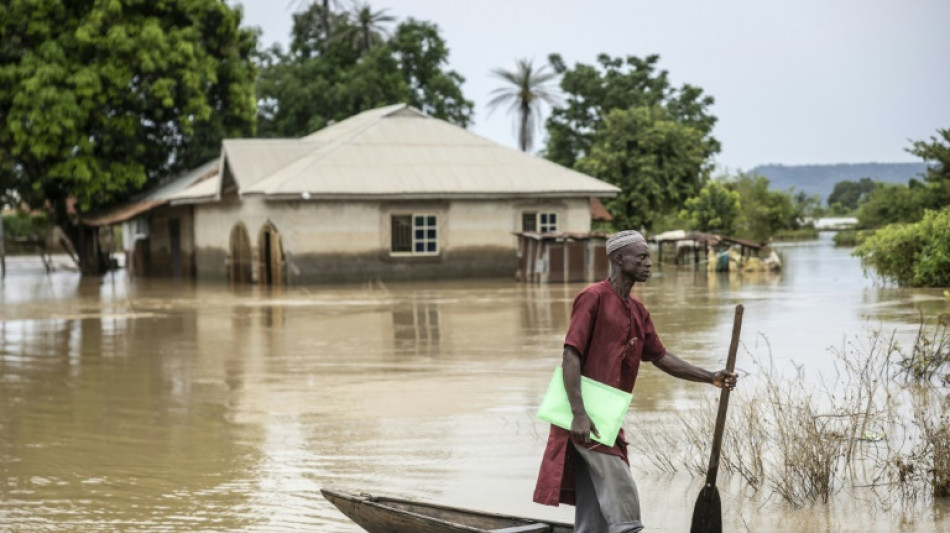
-
 Trump announces tariffs on Iran trade partners as protest toll rises
Trump announces tariffs on Iran trade partners as protest toll rises
-
Sabalenka favourite at Australian Open but faces Swiatek, US threats

-
 Gay Australian footballer Cavallo alleges former club was homophobic
Gay Australian footballer Cavallo alleges former club was homophobic
-
Trump has options on Iran, but first must define goal

-
 Paris FC's Ikone stuns PSG to knock out former club from French Cup
Paris FC's Ikone stuns PSG to knock out former club from French Cup
-
Australia's ambassador to US leaving post, marked by Trump rift

-
 Slot angered by 'weird' Szoboszlai error in Liverpool FA Cup win
Slot angered by 'weird' Szoboszlai error in Liverpool FA Cup win
-
Szoboszlai plays hero and villain in Liverpool's FA Cup win

-
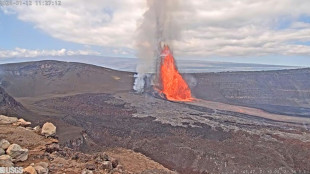 Hawaii's Kilauea volcano puts on spectacular lava display
Hawaii's Kilauea volcano puts on spectacular lava display
-
US stocks at records despite early losses on Fed independence angst

-
 Koepka rejoins PGA Tour under new rules for LIV players
Koepka rejoins PGA Tour under new rules for LIV players
-
Ex-France, Liverpool defender Sakho announces retirement

-
 Jerome Powell: The careful Fed chair standing firm against Trump
Jerome Powell: The careful Fed chair standing firm against Trump
-
France scrum-half Le Garrec likely to miss start of Six Nations

-
 AI helps fuel new era of medical self-testing
AI helps fuel new era of medical self-testing
-
Leaders of Japan and South Korea meet as China flexes muscles

-
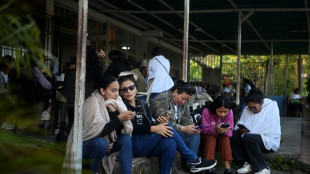 Trump sets meeting with Venezuelan opposition leader, Caracas under pressure
Trump sets meeting with Venezuelan opposition leader, Caracas under pressure
-
Australia captain Alyssa Healy to retire from cricket

-
 US 'screwed' if Supreme Court rules against tariffs: Trump
US 'screwed' if Supreme Court rules against tariffs: Trump
-
NATO, Greenland vow to boost Arctic security after Trump threats

-
 Israel to take part in first Eurovision semi-final on May 12
Israel to take part in first Eurovision semi-final on May 12
-
How Alonso's dream Real Madrid return crumbled so quickly

-
 Ex-Fed chiefs, lawmakers slam US probe into Jerome Powell
Ex-Fed chiefs, lawmakers slam US probe into Jerome Powell
-
Former Panama leader on trial over mega Latin America corruption scandal

-
 Trump keeping Iran air strikes on the table: White House
Trump keeping Iran air strikes on the table: White House
-
Paramount sues in hostile bid to buy Warner Bros Discover

-
 Ugandan opposition leader Bobi Wine warns of protests if polls rigged
Ugandan opposition leader Bobi Wine warns of protests if polls rigged
-
Airbus delivers more planes in 2025

-
 Alonso leaves Real Madrid, Arbeloa appointed as coach
Alonso leaves Real Madrid, Arbeloa appointed as coach
-
UK pays 'substantial' compensation to Guantanamo inmate: lawyer
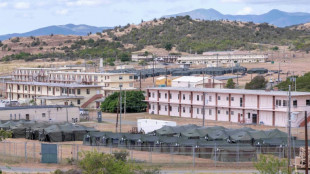
-
 Iran protest toll mounts as government stages mass rallies
Iran protest toll mounts as government stages mass rallies
-
Gold hits record high, dollar slides as US targets Fed

-
 Cuba denies being in talks with Trump on potential deal
Cuba denies being in talks with Trump on potential deal
-
Scientists reveal what drives homosexual behaviour in primates

-
 Venezuela releases more political prisoners as pressure builds
Venezuela releases more political prisoners as pressure builds
-
15,000 NY nurses stage largest-ever strike over conditions

-
 Rosenior plots long Chelsea stay as Arsenal loom
Rosenior plots long Chelsea stay as Arsenal loom
-
Zuckerberg names banker, ex-Trump advisor as Meta president

-
 Reza Pahlavi: Iran's ex-crown prince dreaming of homecoming
Reza Pahlavi: Iran's ex-crown prince dreaming of homecoming
-
Venezuela releases more political prisoners
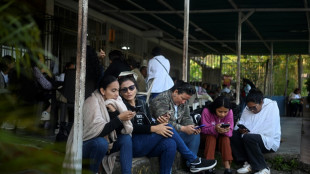
-
 Kenya's NY marathon champ Albert Korir gets drug suspension
Kenya's NY marathon champ Albert Korir gets drug suspension
-
US prosecutors open probe of Fed chief, escalating Trump-Powell clash

-
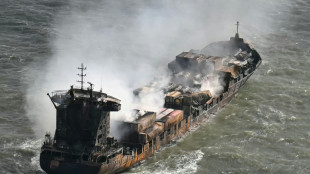 Russian captain in fiery North Sea crash faces UK trial
Russian captain in fiery North Sea crash faces UK trial
-
Carrick is frontrunner for interim Man Utd job: reports

-
 Iran government stages mass rallies as alarm grows over protest toll
Iran government stages mass rallies as alarm grows over protest toll
-
Variawa leads South African charge over Dakar dunes

-
 Swiss inferno bar owner detained for three months
Swiss inferno bar owner detained for three months
-
Heathrow airport sees record high annual passenger numbers
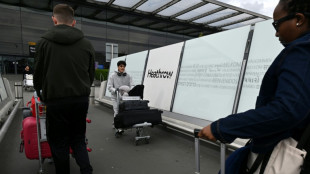
-
 Georgia jails ex-PM for five years amid ruling party oustings
Georgia jails ex-PM for five years amid ruling party oustings
-
Kyiv buries medic killed in Russian drone strike
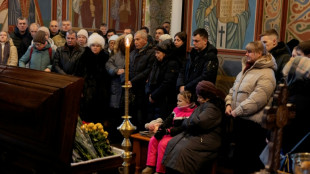

Climate change-worsened floods wreak havoc in Africa
Every rainy season for the past 12 years, floods have swept through 67-year-old Idris Egbunu's house in central Nigeria.
It is always the same story -- the Niger River bursts its banks and the waters claim his home for weeks on end, until he can return and take stock of the damage.
The house then needs cleaning, repairs, fumigation and repainting, until the next rainy season.
Flooding is almost inevitable around Lokoja in Nigeria's Kogi state, where Africa's third-longest river meets its main tributary, the Benue.
But across vast areas of Africa, climate change has thrown weather patterns into disarray and made flooding much more severe, especially this year.
Devastating inundations are threatening the survival of millions of residents on the continent. Homes have been wrecked and crops ruined, jeopardising regional food security.
Torrential rains and severe flooding have affected around 6.9 million people in West and Central Africa so far in 2024, according to data from the United Nations Office for the Coordination of Humanitarian Affairs (OCHA).
- 'Very, very bad' -
Residents and officials around Lokoja said floods first became more severe in Kogi state in 2012 and have battered the area each year since.
In 2022, Nigeria's worst floods in a decade killed more than 500 people and displaced 1.4 million.
Sandra Musa, an emergency agency adviser to the Kogi state governor, believes this year's flooding has not yet reached the level seen in 2022, but warned it was "very, very bad".
"Usually at this time of year the water level drops, but here it's rising again," she told AFP, estimating that the floods have affected around two million people in the state.
Fatima Bilyaminu, a 31-year-old mother and shopkeeper, can only get to her house in the Adankolo district of Lokoja by boat as a result of the waters.
The swollen river rises almost to the windows, while water hyacinths float past the crumbling building.
"I lost everything. My bed, my cushioned chair, my wardrobe, my kitchen equipment," she told AFP.
With no money to rent a house elsewhere, she has little choice but to keep living in the small concrete building and repair it, flood after flood.
- Damage and displacement -
Africa is bearing the brunt of climate change, even though it only contributes around four percent of global greenhouse gas emissions, according to a recent report by the World Meteorological Organisation.
This year is set to overtake 2023 as the world's hottest on record.
"This year has been unusual in terms of the amount of rainfall, with many extreme events, which is one of the signs of climate change," said Aida Diongue-Niang from the UN's Intergovernmental Panel on Climate Change (IPCC).
In the Sahel region bordering the Sahara desert, the volume, intensity and duration of rainfall was "unprecedented," according to Amadou Diakite from the Mali Meteo weather service.
In Niger, some regions recorded up to 200 percent more rain than in previous years, the national meteorological service said. The waters put at risk the historic city centre of Agadez, a UNESCO World Heritage site in the desert north.
Over the border in Chad, torrential rains since July have killed at least 576 people and affected 1.9 million, more than 10 percent of the population, according to a report published by the OCHA.
In neighbouring Cameroon, the UN body said torrential rains had destroyed more than 56,000 homes and flooded tens of thousands of hectares of crops.
Floodwaters swept through the capital Conakry in Guinea, while floods in Monrovia reignited debates over building another city to serve as Libera's capital.
Entire districts of Mali's capital Bamako were submerged, leaving waste and liquid from septic tanks seeping across the streets.
In August, downpours caused the roof of the centuries-old Tomb of Askia in the Malian city of Gao to collapse.
Several countries have postponed the start of the school year as a result of the floods.
- 'Keep getting worse' -
"It used to be a decadal cycle of flooding, and we're now into a yearly cycle," said Clair Barnes, a researcher at the Centre for Environmental Policy at Imperial College London.
"This is only going to keep getting worse if we keep burning fossil fuels," she said.
As global temperatures rise, extreme weather events will increase in frequency and intensity, scientists warn.
Experts estimate that by 2030, up to 118 million Africans already living in poverty will be exposed to drought, floods and intense heat.
Building along riverbanks also poses a risk, Youssouf Sane of Senegal's meteorology agency said, urging governments to think about the relationship between climate change and urbanisation.
But the IPCC's Diongue-Niang said the only way to tackle extreme weather was to limit greenhouse gas emissions.
"That doesn't fall to the region -- it falls to the whole of humanity," she said.
U.AlSharif--SF-PST



